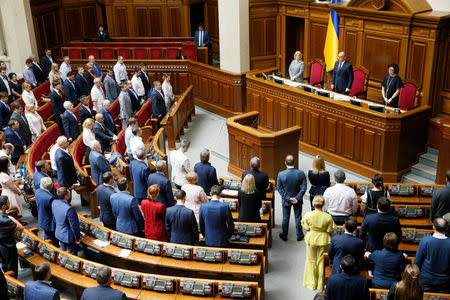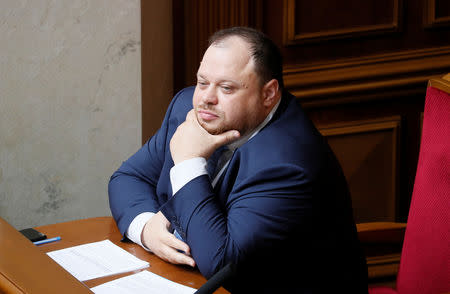Ukraine parliament takes aim at president's election reform plan
By Pavel Polityuk and Natalia Zinets
KIEV (Reuters) - Parliament dealt an early blow to President Volodymyr Zelenskiy on Wednesday by rejecting proposed changes to Ukraine's voting system before a snap national election, which the speaker said lawmakers would seek to annul.
A comedian with no prior political experience, Zelenskiy won last month's presidential election by a landslide on promises to fight corruption and shake up the political establishment.
With his new party having no seats in parliament, he quickly dissolved the legislature and scheduled a national election for July 21.
Wednesday's vote offered a glimpse of lawmakers' ability to frustrate his reform agenda at least until that ballot, which Zelenskiy's new grouping is expected to win.
"Old politicians chose the old system, because only it gives them a chance to extend their political life," Zelenskiy said in a statement posted on Facebook, criticising parliament, known as the Verkhovna Rada.
"They are counting on money and buckwheat to get them to the Verkhovna Rada again. But I'm convinced that they are wrong," he said. "Buckwheat" refers to the practice of bribing voters during elections.
In a sign that more trouble could be in store, speaker Andriy Parubiy accused Zelenskiy of causing a constitutional crisis by dissolving parliament and calling the election, and said lawmakers would challenge the decision in court.
Zelenskiy needs parliament to vote for reforms he promised to voters on the campaign trail, including stripping lawmakers of immunity from prosecution. Parliament also needs to vote on laws needed to keep foreign aid flowing.
During campaigning, Zelenskiy promised to scrap Ukraine's mixed voting system, which he believes would narrow the scope for corruption and vote buying.
At present, 50 percent of seats are determined by proportional voting through election party lists and 50 percent by electing lawmakers in local constituencies.
The law change would scrap the constituencies, which Zelenskiy argues are vulnerable to powerful local interests. It would also help Zelenskiy, whose party does not have a strong regional presence in the way established parties do, analysts say.
But lawmakers said the changes would fuel corruption rather than preventing it.
"(They)... do not strengthen democratic standards, but rather they make them worse," said Artur Gerasimov, the head of the faction of former President Petro Poroshenko, who Zelenskiy defeated in April.
Lawmakers also criticised Zelenskiy's appointments to key positions, which included some of his business partners and Andriy Bogdan, a lawyer with links to one of Ukraine's richest men.
"He is appointing all of his business partners to government posts," said Oleh Lyashko, an opposition party leader. "How is it different from Poroshenko?"
(Writing by Matthias Williams; Editing by Catherine Evans and John Stonestreet)

 Yahoo News
Yahoo News 


